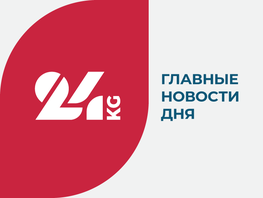Parliament of Kyrgyzstan adopted a law regulating the legal framework for production of organic agricultural products and their certification. We will see goods with confirmed labeling «organic», «bio» and «eco» on the shelves of domestic stores in the near future. In an interview with 24.kg news agency Emil Omuraliev, the UN FAO project manager for the development of organic production, told about the changes this innovation will bring to farmers, exporters and domestic consumers, whether it will affect prices and whether it will lead to a shortage of goods.
— I suggest starting with the basics. What is organic agriculture?
— This is a farming method that deliberately minimizes the use of synthetic fertilizers, pesticides, plant growth regulators, and other harmful substances. This is the rejection of the use of pesticides, herbicides, artificial fertilizers and antibiotics, use of animal and plant waste as fertilizers, use of crop rotation to restore the soil, use of biological methods of plant protection. Its main principle is health, and it applies to all processes: soil and water quality, process of growing and processing products, their labeling, transportation, storage and sale.
— How developed are these principles in Kyrgyzstan today?
— The organic movement in the republic exists for about 12-13 years. There are associates, people who support its philosophy — these are both producers and consumers. Speaking in percentage terms, about 30,000 hectares out of more than a million hectares of irrigated farmland throughout Kyrgyzstan in these years have passed international certification and are already classified as organic agriculture. More than 20 organic aimaks are successfully operating — associations that have voluntarily joined this process through the guarantee participation system. The project to create an institutional and legal framework for organic agriculture was implemented by FAO with financial support from the Korea International Cooperation Agency (KOICA).
Organic products grown in Kyrgyzstan are highly valued on international markets and often win prizes at foreign exhibitions.
Organic honey, walnut grown in Arslanbob, Batken apricot, Aksy prunes, Issyk-Kul valerian and other products are in great demand.
The meat of yaks grown on highland pastures, not in stables, is in great demand. Prospects for development are very good, since the vast majority of our farmland is located in ecologically clean areas.
— This is not the first attempt to develop organic agriculture in the republic. The first law was passed in 2019. Why didn’t it ever work?
— The previous law did not work in full because it did not contain the main regulatory mechanisms. Our certificates are not recognized everywhere in the world. The rights, duties and responsibilities of all participants in the process were not clearly spelled out. The document was unfinished and did not cover the entire area, and was limited only to agriculture. All these shortcomings are corrected in the new law, and the scope of its application is expanded.
Now, not only food, but also other products can be considered organic — for example, textiles, handicrafts, toys, medicinal plants, and so on.
The same well-known abroad yurts, which are made from environmentally friendly raw materials by our craftsmen from Kyzyl-Tuu village. There is a store representing their products in Europe. Now they will be able to get a certificate and sell them with the label «organic» or «eco» and, of course, sell at a higher price, because certification is a guarantee of safety, and this is highly valued in Europe.
— How will the certification be carried out?
— Certification will be carried out by private companies that have been accredited by the Ministry of Economy and meet the necessary criteria and international standards. Control over the process is assigned to the authorized state body — the Ministry of Agriculture and its department of organic agriculture. The certificate will be issued for one year. On average, certification of one production costs $10,000-15,000. This is an international rate, which also depends on the volume of production. We are working to make this service in Kyrgyzstan cheaper and more accessible.
— Will it be mandatory for all farmers?
— No, certification is voluntary. There will be no coercion. First of all, those who are engaged in export are interested in it.
If the manufacturer does not want to be certified, he or she will have to comply with labeling rules — not to indicate on the label that the product is organic.
It is no secret that today the market offers a wide range of products labeled «organic», «bio» and «eco», but in fact, unfortunately, most of it is still just an unproved marketing ploy. The law provides for a three-year transitional period — the time during which the manufacturer will be able to get certified, if he is interested in this.
— Will this affect the prices and the shortage of goods? After all, the manufacturer will have to somehow cover the costs of certification — to increase the cost or export volumes ...
— This will not affect the domestic market of Kyrgyzstan. There will be no increase in prices or deficit of goods. I would like to stress once again that this innovation applies mainly to exporters who had been working for the external market before, but now they will be able to reasonably sell their products at a higher price.
There is no need to be afraid that all farmers will suddenly switch to organic production and become exporters. It’s expensive and difficult.
In addition, the external and internal markets are separated and each of them has its own advantages. There are those who traditionally work for export, for example, farmers who grow beans in Talas region, and those who cover the internal needs of the republic.
Domestic consumers will be able to choose whether to buy more expensive, certified products or more affordable. There is no such choice now. You buy a more expensive product labeled «organic», «eco», or «bio», and you’re not sure if it’s really safe.
— How have exporters reacted to the law?
— The interest of exporters is very high. People want to get more income. In terms of exports, the international organic market is a good niche.
Kyrgyzstan is not yet able to produce a large amount of traditional products for export. Therefore, organic production is a promising way of development.
Take, for example, beans — a monoculture of Talas region. Almost all of it is exported, because we traditionally consume it in small volumes. There are those among Talas farmers who have already passed international certification privately, and they note that their income has become two to three times higher.
— Is there a system of government support for those who decide to engage in organic production?
— A draft national organic production program has been developed for 2023-2027. It spells out various steps and activities — opening of municipal organic markets, provision of shelves in stores of large retail chains, priority for participation in public procurement. The Ministry of Agriculture and the Cabinet of Ministers are working on this today. The issue of separation of «organic production» into a cluster with the possibility of additional concessional financing, for example, allocation of concessional loans, is also being considered. But don’t expect a boom. Transition to organic production is a long and expensive process. We predict that the number of organic farmers will increase by 20-25 percent in the next ten years.






